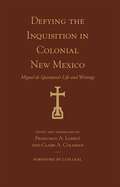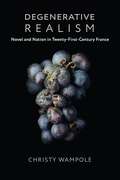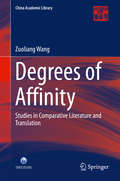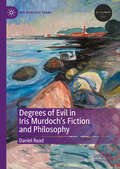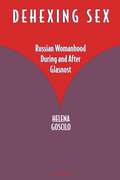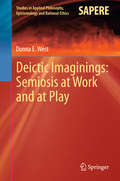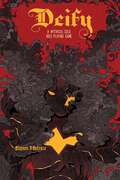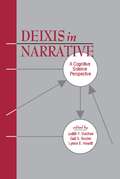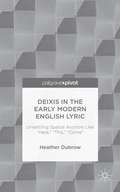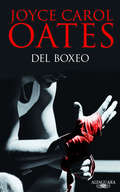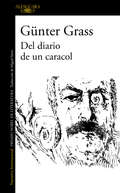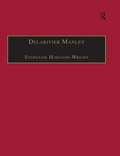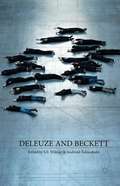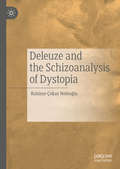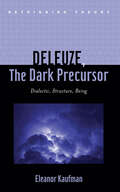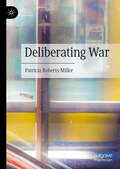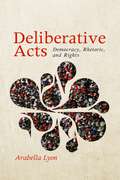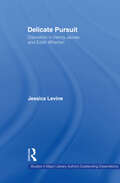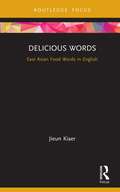- Table View
- List View
Defying the Inquisition in Colonial New Mexico: Miguel de Quintana's Life and Writings (Pasó Por Aquí Series on the Nuevomexicano Literary Heritage)
by Francisco A. Lomelí and Clark A. ColahanMiguel de Quintana was among those arriving in New Mexico with Diego de Vargas in 1694. He was active in his village of Santa Cruz de la Cañada where he was a notary and secretary to the alcalde mayor, functioning as a quasi-attorney. Being unusually literate, he also wrote personal poetry for himself and religious plays for his community. His conflicted life with local authorities began in 1734, when he was accused of being a heretic. What unfolded was a personal drama of intrigue before the colonial Inquisition.Francisco A. Lomelí and Clark Colahan dug deep into Inquisition archives to recover Quintana's writings, the second earliest in Hispanic New Mexico's literary heritage. First, they present an essay focused on Church and society in colonial New Mexico and on Quintana's life. The second portion is a translation of and critical look at Quintana's poetry and religious plays.
Degenerative Realism: Novel and Nation in Twenty-First-Century France (Literature Now)
by Christy WampoleA new strain of realism has emerged in France. The novels that embody it represent diverse fears—immigration and demographic change, radical Islam, feminism, new technologies, globalization, American capitalism, and the European Union—but these books, often best-sellers, share crucial affinities. In their dystopian visions, the collapse of France, Europe, and Western civilization is portrayed as all but certain and the literary mode of realism begins to break down. Above all, they depict a degenerative force whose effects on the nation and on reality itself can be felt.Examining key novels by Michel Houellebecq, Frédéric Beigbeder, Aurélien Bellanger, Yann Moix, and other French writers, Christy Wampole identifies and critiques this emergent tendency toward “degenerative realism.” She considers the ways these writers draw on social science, the New Journalism of the 1960s, political pamphlets, reportage, and social media to construct an atmosphere of disintegration and decline. Wampole maps how degenerative realist novels explore a world contaminated by conspiracy theories, mysticism, and misinformation, responding to the internet age’s confusion between fact and fiction with a lament for the loss of the real and an unrelenting emphasis on the role of the media in crafting reality. In a time of widespread populist anxieties over the perceived decline of the French nation, this book diagnoses the literary symptoms of today’s reactionary revival.
Degrees of Affinity
by Zuoliang WangThis book combines two collections of essays written by the late professor Zuoliang Wang, works that explore the affinity between literatures and peoples, with special attention given to that between Chinese literature and western literature in the 20th century, and which underscore the role of translation therein. Both collections have been previously published in book form: Degrees of Affinity--Studies in Comparative Literature (1985) and A Sense of Beginning--Studies in Literature and Translation (1991). As a prominent literary critic, literary historian, translator and 20th-century Chinese poet, Wang has played a unique part in English education in China. His research interests range widely, from English literature through comparative literature to translation and cultural studies, fields in which he has made outstanding accomplishments. Wang pioneered the concept of "affinity" in talking about interactions between literatures and peoples, which has since won great acclaim from both critics and common readers at home and abroad. As he points out, "momentous changes often occur when a foreign literature satisfies a sore need of an indigenous literature, thus developing a strong affinity. . . " And translation can fulfill a crucial role in bringing about affinity between literatures and peoples. According to Professor Wang, "Nothing is more crucial in cultural contacts, not to say cultural interactions, than translation, particularly in a country that for long periods closed its doors to the outside world, like China. "
Degrees of Evil in Iris Murdoch's Fiction and Philosophy (Iris Murdoch Today)
by Daniel ReadThis is the first survey of Murdoch’s exploration of evil, addressing aesthetic, philosophical, political and theological perspectives. The study demonstrates how her work engages with currently urgent issues of trauma, terrorism and psychopathy and brings her works into dialogue with key figures in twentieth- and twenty-first-century discussions of evil, including Hannah Arendt, Carl Gustav Jung, Susan Neiman and Simone Weil. These resonances are traced through close readings of Murdoch’s published fiction and philosophy in combination with unpublished texts, including annotations, interviews and letters. Murdoch’s detailed and nuanced portrayal of evil invites readers to explore the complexities of human behaviour and the potential for moral failure.
Dehexing Sex: Russian Womanhood During and After Glasnost
by Helena GosciloGlasnost and the collapse of the Soviet Union revolutionized Russian society. What effects, however, did they have on the status, role, and image of women in Russian culture? Examining the past turbulent decade of transition to "democracy" and a market economy, Dehexing Sex traces the ways in which Russia's concept of womanhood both changed and remained the same, taking into account dominant ideologies and social philosophies, sociopolitical organizations, women's writings, literary criticism, film, and popular cultural forms such as pornography. The lively, engaging chapters of this book examine texts by contemporary women writers in the context of the political, social, economic, biological, psychological, and aesthetic transformations that helped define them. Goscilo reveals that the Russian cultural revolution has reshaped the female image in varied and often contradictory ways. While increased interaction with the West fostered gender awareness, it also introduced imported Western sexist practices--especially the exploitation of female bodies--formerly proscribed by a puritanical censorship. Popular magazines, newspapers, and television propagated the image of woman as mother, ornament, and sexual object, even as women's fiction conceived of womanhood in complex psychological terms that undermined the gender stereotypes which had ruled Soviet thinking for more than 70 years. With the aid of feminist and cultural theory, Dehexing Sex investigates the overt and internalized misogyny that combined with the genuinely liberalizing forces unleashed by Gorbachev's policy of glasnost and perestroika. It exposes Russia's repressive romance with womanhood as a metaphor for nationhood and explores Russian women's ironic recasting of national mythologies. "Impressive . . . an important contribution to Russian studies and to women's studies. The author is an outstanding scholar, an energetic and original thinker, and her writing sparkles with imagination and wit." --Stephanie Sandler, Amherst College Helena Goscilo is Associate Professor and Chair of Slavic Languages and Literatures, University of Pittsburgh.
Deictic Imaginings: Semiosis at Work and at Play
by Donna E. WestThis work represents the first integrated account of how deixis operates to facilitate points of view, providing the raw material for reconciling index and object. The book offers a fresh, applied philosophical approach using original empirical evidence to show that deictic demonstratives hasten the recognition of core representational constructs. It presents a case where the comprehension of shifting points of view by means of deixis is paramount to a theory of mind and to a worldview that incorporates human components of discovering and extending spatial knowledge. The book supports Peirce's triadic sign theory as a more adequate explanatory account compared with those of Bühler and Piaget. Peirce's unitary approach underscores the artificiality of constructing a worldview driven by logical reasoning alone; it highlights the importance of self-regulation and the appreciation of otherness within a sociocultural milieu. Integral to this semiotic perspective is imagination as a primary tool for situating the self in constructed realities, thus infusing reality with new possibilities. Imagination is likewise necessary to establish postures of mind for the self and others. Within these imaginative scenarios (consisting of overt, and then covert self dialogue) children construct their own worldviews, through linguistic role-taking, as they legitimize conflicting viewpoints within imagined spatial frameworks.
Deify: A Mythical Solo Role-Playing Game
by Allyson D'AntonioDiscover Deify, a captivating creative writing RPG based on mythology from around the world. Create your own deity, molding new gods and their fate from inception to demise. Manage divine resources like domains, epithets, and mortal champions, and navigate written prompts with a tarot deck (not included). Stunning art from illustrator Maia Trewartha will inspire you to visualize unique deities born from gameplay rules, and beautifully designed player sheets and notebook pages will help you capture your journey. As your story unfolds, embrace the enigmatic world beyond worship—will you be merciful or vengeful, benevolent or cruel? The choice is yours, shaped by the cards' will. Dive into Deify for an immersive experience unlike any other! A magnificently illustrated hardcover with gold foil details.
Deixis in Narrative: A Cognitive Science Perspective
by Judith F. Duchan Gail A. Bruder Lynne E. HewittThis volume describes the theoretical and empirical results of a seven year collaborative effort of cognitive scientists to develop a computational model for narrative understanding. Disciplines represented include artificial intelligence, cognitive psychology, communicative disorders, education, English, geography, linguistics, and philosophy. The book argues for an organized representational system -- a Deictic Center (DC) -- which is constructed by readers from language in a text combined with their world knowledge. As readers approach a new text they need to gather and maintain information about who the participants are and where and when the events take place. This information plays a central role in understanding the narrative. The editors claim that readers maintain this information without explicit textual reminders by including it in their mental model of the story world. Because of the centrality of the temporal, spatial, and character information in narratives, they developed their notion of a DC as a crucial part of the reader's mental model of the narrative. The events that carry the temporal and spatial core of the narrative are linguistically and conceptually constrained according to certain principles that can be relatively well defined. A narrative obviously unfolds one word, or one sentence, at a time. This volume suggests that cognitively a narrative usually unfolds one place and time at a time. This spatio-temporal location functions as part of the DC of the narrative. It is the "here" and "now" of the reader's "mind's eye" in the world of the story. Organized into seven parts, this book describes the goal of the cognitive science project resulting in this volume, the methodological approaches taken, and the history of the collaborative effort. It provides a historical and theoretical background underlying the DC theory, including discussions of deixis in language and the nature of fiction. It goes on to outline the computational framework and how it is used to represent deixis in narrative, and details the linguistic devices implicated in the DC theory. Other subjects covered include: crosslinguistic indicators of subjectivity, psychological investigations of the use of deixis by children and adults as they process narratives, conversation, direction giving, implications for emerging literacy, and a narrator's experience in writing a short story.
Deixis in the Early Modern English Lyric: Unsettling Spatial Anchors Like Here, This, Come
by Heather DubrowThis book engages with deictics ('pointing' words like here/there, this/that) of space. It focuses on texts by Donne, Shakespeare, Spenser, and Wroth in particular, relating their forms of deixis to cultural and generic developments; but it also suggests parallels with both iconic and neglected texts from a range of later historical periods.
Del
by Barbara W. MakarA systematic, phonics-based early reading program that includes: the most practice for every skill, decodable readers for every skill, and reinforcement materials--help struggling students succeed in the regular classroom
Del boxeo
by Joyce Carol Oates«Si no se puede golpear, por lo menos se puede ser golpeado, y saber que todavía se está vivo.» Del boxeo es un ensayo sencillo, dramático y de una profundidad evocadora. Te golpea convirtiendo tus recuerdos en jumps, ganchos o rectos de derecha. Te coloca en una posición en donde la insensibilidad solo te convierte en una cosa: un boxeador. Un ensayo donde la exitosa novelista estadounidense vierte certeras reflexiones sobre ser pobre y obstinado, sobre la necesidad de crear héroes y saber triunfar, llevando su mirada y conduciendo la nuestra hacia las raíces del boxeo, aportado singulares puntos de vista sobre un tema del cual escribieron autores como Ernest Hemingway o Mark Twain: el boxeo como metáfora, como espectáculo e historia, el boxeo visto por la literatura, el cine y las mujeres. «El boxeo es una celebración de la religión perdida de la masculinidad, tanto más contundente por estar perdida.» ** Premio Ja! Bilbao por el «modernísimo humor negro» de su obra. La crítica ha dicho...«La Sra. Oates lleva al boxeo la misma inteligencia que aplica a su ficción, con su lucha humana, sus combates íntimos en público, sus decepciones, sus triunfos y fracasos de la voluntad.»The New York Times
Del diario de un caracol
by Günter GrassUno de los textos más personales del Premio Nobel alemán. Ideado como un diario de la campaña electoral que realizó en 1969 a favor de la candidatura de Willy Brandt, trasciende por su complejidad la mera anécdota política, para instalarse entre el ensayo y la prosa poética. En 1969, Günter Grass participa en la campaña electoral a favor del Partido Socialista de Alemania y, muy especialmente, de su amigo Willy Brandt. El diario de su gira le sirve luego para escribir un libro en el que las fronteras entre narrativa, política y autobiografía se confunden. El autor se dirige a sus cuatro hijos -y, así, a las nuevas generaciones alemanas- para hablarles de la democracia y de los horrores del Tercer Reich. Y crea una historia: la del profesor de instituto Hermann Ott, llamado «Zweifel» (duda), que apoyó a los judíos de Dánzig durante su persecución y expulsión. Para Grass, el riesgo está siempre en los extremos. El simbolismo político del caracol resulta claro: en la historia del progreso no hay saltos sino un lento deslizarse hacia adelante, y desde esa idea lucha contra quien pretenden sobrepasarlo por la izquierda o la derecha. «Sólo quien se ha sentado en una vacía concha de caracol y ha vivido en el lado de sombra de la Utopía puede medir el progreso.»
Delarivier Manley: Printed Writings 1641–1700: Series II, Part Three, Volume 12 (The Early Modern Englishwoman: A Facsimile Library of Essential Works & Printed Writings, 1641-1700: Series II, Part Three #Vol. 12)
by Stephanie Hodgson-WrightThe works included in this volume constitute Delarivier Manley's early oeuvre, written in the seventeenth century. They comprise one epistolary novella, Letters Written [sic] by Mrs Manley; one commendatory poem 'To the Author of Agnes de Castro'; one comedy, The Lost Lover, or The Jealous Husband, one tragedy, The Royal Mischief; and two commemorative poems, 'Melpomeme: The Tragick Muse' and 'Thalia: The Comick Muse'. In the light of new readings of Delarivier Manley's early work, this volume demonstrates her important contribution to the literary and theatrical milieu of the late seventeenth century.
Deleuze and Beckett
by S. E. Wilmer Audronė ŽukauskaitėDeleuze and Beckett is a collection of essays illuminating similarities between the philosophies and practices of Deleuze and Beckett. The contributors include some of the leading Beckett and Deleuze specialists in the world, and their essays address different ideas and concepts of Deleuzian philosophy as well as a wide range of Beckett's oeuvre, including his novels, short stories, stage and television plays, and film work. The book considers Deleuze's interpretation of Beckett's work anddemonstrates that Deleuzian concepts and ideas can be usefully applied to Beckett's texts in order provide a greater understanding of Beckett's characters and their journeys. Deleuze's philosophy helps us to recognize that what has been seen as the private territory of despair, loneliness, and emptiness in Beckett's work masks a world of flow and fluctuation that expresses multiple and heterogeneous possibilities.
Deleuze and the Schizoanalysis of Dystopia
by Rahime Çokay NebioğluThis book offers an insightful history of dystopian literature, integrating it within the conceptual schemas of Deleuze and Guattari. Unlike earlier examples of dystopia which depict representations of a possible future that is remarkably worse than present society, contemporary dystopia often tends to portray an almost allegorical re-presentation of present society. Tracing dystopia’s shift from transcendence towards immanence with the rise of late neoliberal capitalism and control-societies, Çokay Nebioğlu skilfully constructs a new taxonomy of dystopian fiction to address this changing dynamic. Accompanied by a subtle exploration of earlier and later examples of the genre by George Orwell, Aldous Huxley, Suzanne Collins, Veronica Roth, William Gibson, Max Barry, Dave Eggers, Cindy Pon, and Tahsin Yücel along with rich and nuanced analysis of China Mieville’s Perdido Street Station and Margaret Atwood’s MaddAddam trilogy, the book seeks not only to track the transformation of dystopia in light of worldwide cultural, political and economic transformation, but also to conduct a schizoanalytic reading of dystopia, thus opening up an exciting field of enquiry for Deleuzian scholars.
Deleuze, The Dark Precursor: Dialectic, Structure, Being (Rethinking Theory)
by Eleanor KaufmanA thoughtful and original analysis of the writings of influential French philosopher Gilles Deleuze.Gilles Deleuze is considered one of the most important French philosophers of the twentieth century. Eleanor Kaufman situates Deleuze in relation to others of his generation, such as Jean-Paul Sartre, Pierre Klossowski, Maurice Blanchot, and Claude Lévi-Strauss, and she engages the provocative readings of Deleuze by Alain Badiou and Slavoj Žižek.Deleuze, The Dark Precursor is organized around three themes that critically overlap: dialectic, structure, and being. Kaufman argues that Deleuze's work is deeply concerned with these concepts, even when he advocates for the seemingly opposite notions of univocity, nonsense, and becoming. By drawing on scholastic thought and reading somewhat against the grain, Kaufman suggests that these often-maligned themes allow for a nuanced, even positive reflection on apparently negative states of being, such as extreme inertia. This attention to the negative or minor category has implications that extend beyond philosophy and into feminist theory, film, American studies, anthropology, and architecture.
Deliberating War
by Patricia Roberts-MillerThis book argues that treating politics as war derails essential democratic processes, including deliberation and policy argumentation, in complicated ways. “Politics is war” is not always just a figure of speech, but often a sincere expression of how people see disagreement—they mean it literally—and they use it to evade the responsibilities of rhetoric. This book takes the metaphor seriously. Using a series of case studies ranging from the 432 BCE “Debate at Sparta” to Bill O’Reilly’s recent invention of a “War on Christmas,” Deliberating War illustrates pathologies of deliberation that arise when a community understands itself to be at political war. This book identifies recurrent rhetorical strategies that constrain or even effectively prohibit deliberation, such as deflecting, reframing, threat inflation, appealing to paired terms, claiming moral license, radicalizing a base. In short, what seems to be an effective solution to an immediate rhetorical problem—using hyperbole and demagoguery to persuade people to adopt a specific leader or policy—is a trap that prevents democratic practices of compromise, deliberation, fairness, reciprocity. Unhappily, threat inflation—even when well-intentioned--At some point, hyperbolic rhetoric becomes threat inflation, and then that inflated threat becomes the premise of policies, both foreign and domestic. And then agreeing as to the obvious existential threat posed by the Other and uniting behind the obvious policy solution is a necessary sign of being on the side of Good. Once communities become persuaded that they are in an apocalyptic battle between Good and Evil, politics as war can quickly become real war—often with far-reaching and catastrophic consequences.
Deliberative Acts: Democracy, Rhetoric, and Rights (Rhetoric and Democratic Deliberation #7)
by Arabella LyonThe twenty-first century is characterized by the global circulation of cultures, norms, representations, discourses, and human rights claims; the arising conflicts require innovative understandings of decision making. Deliberative Acts develops a new, cogent theory of performative deliberation. Rather than conceiving deliberation within the familiar frameworks of persuasion, identification, or procedural democracy, it privileges speech acts and bodily enactments that constitute deliberation itself, reorienting deliberative theory toward the initiating moment of recognition, a moment in which interlocutors are positioned in relationship to each other and so may begin to construct a new lifeworld. By approaching human rights not as norms or laws, but as deliberative acts, Lyon conceives rights as relationships among people and as ongoing political and historical projects developing communal norms through global and cross-cultural interactions.
Deliberative Acts: Democracy, Rhetoric, and Rights (Rhetoric and Democratic Deliberation)
by Arabella LyonThe twenty-first century is characterized by the global circulation of cultures, norms, representations, discourses, and human rights claims; the arising conflicts require innovative understandings of decision making. Deliberative Acts develops a new, cogent theory of performative deliberation. Rather than conceiving deliberation within the familiar frameworks of persuasion, identification, or procedural democracy, it privileges speech acts and bodily enactments that constitute deliberation itself, reorienting deliberative theory toward the initiating moment of recognition, a moment in which interlocutors are positioned in relationship to each other and so may begin to construct a new lifeworld. By approaching human rights not as norms or laws, but as deliberative acts, Lyon conceives rights as relationships among people and as ongoing political and historical projects developing communal norms through global and cross-cultural interactions.
Delicate Pursuit: Discretion in Henry James and Edith Wharton (Studies in Major Literary Authors #13)
by Jessica LevineFirst published in 2002. Routledge is an imprint of Taylor & Francis, an informa company.
Delicious Words: East Asian Food Words in English
by Jieun KiaerAs societies across the globe are becoming increasingly interwoven at an unprecedented speed and across an impressive scope, so too is the world of food, allowing the English language to develop an ever-widening culinary vocabulary. This book examines the lives of such words in today’s discourse on eating and drinking, focusing on foreign - particularly East Asian - influences on culinary terms in English, and how words are born and evolve in a modern transcultural environment. Through the lens of culinary words, this book demonstrates that foreign-origin and hybrid words, previously considered marginal, have become a main source of new imports into our daily lexicon. With case studies from Japan to Mongolia, Hong Kong to Korea, China to Vietnam, and beyond, this book examines how more and more words are becoming borderless and forming their own new global identities. By showcasing some lesser-known regional cuisines, alongside staple dishes that many of us already know and love, this book offers a wide range of examples in order to illustrate the metamorphosis of the manner in which we engage with food words. This book will be of interest to general readers, as well as those who are engaged in East Asian studies, English linguistics, intercultural communication studies, translation studies, and lexicography.
